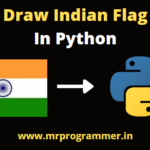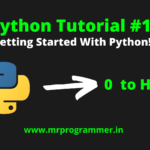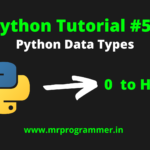Python is a popular language in the programming world, and most coders start their coding journey with Python. And we as Beginners often make some mistakes which we must avoid as a fresher. But in the excitement of starting something new, we end up making mistakes that we regret. So, In this blog post, we will look at some of the common mistakes beginners make in Python, which you should avoid as a newbie.
Table of Contents
Some Common Mistakes Beginners Make in Python
Here are the 9 Common Mistakes Beginners Make in Python while they code:
Common Mistake 1: Misunderstanding Indentations
One of the most Common Mistakes Beginners Make in Python is they misunderstand indentations in Python while coding. Unlike other programming languages that use braces ‘{ }’ to define code blocks, python uses Indentation levels, where each block must be indented consistently.
Also Read: How to Check Python Version In Windows, Mac, And Linux – Complete Guide
Example of Incorrect Indentation
if True:
print("This will cause an IndentationError")
Correct Indentation
if True:
print("This is correctly indented")
Tip to Avoid This Common Mistake
Always check that code blocks are intended correctly and make use of an IDE or code editor that highlights that indentation levels, so that it can prevent such errors.
Common Mistake 2: Incorrect Use Of Variables
As beginners, we often use variables the incorrect way, and make mistakes in naming, scope management, and type handling.
Some common Errors
- Naming mistakes:
myVariable = 10
myvariable = 20
print(MyVariable) # This will cause a NameError
2. Scope misunderstanding:
def my_function():
x = 10
print(x) # This will cause a NameError as x is not defined outside the function
3. Type Errors:
a = "5"
b = 10
print(a + b) # This will cause a TypeError
Tip to Avoid This Common Mistake
- Use a descriptive name that completely defines your variable
- Understand variable scope
- Be mindful of variable types and conversions.
Common Mistake 3: Improper Handling of Lists and Loops
Lists and Loops are a basic concept in Python, but they can be confusing for beginners:
Some common mistakes
- Modifying Lists while iterating:
numbers = [1, 2, 3, 4]
for num in numbers:
if num % 2 == 0:
numbers.remove(num)
2. Off-by-One Errors in Loops:
for i in range(5):
print(i) # Beginners often confuse range(n) with including the end value n
Tip to Avoid This Common Mistake
- Avoid modifying lists while iterating. Instead, create a new list or use list comprehensions.
- Understand how the ‘range()’ function works.
Common Mistake 4: Misusing Functions
Functions are crucial for code reusability and organization, but beginners often misuse them.
Some common Errors
- Not Defining Functions Properly:
def my_function
print("Hello, World!")
2. Improper Argument Handling:
def greet(name):
print("Hello, " + name)
greet() # This will cause a TypeError
Tip to Avoid This Common Mistake
- Make sure functions are defined correctly with proper syntax.
- Handle function arguments appropriately and provide default values where necessary.
Common Mistake 5: Ignoring Error Handling
Beginners often ignore error handling, leading to unhandled exceptions and crashes.
Some common mistakes
- No Error Handling:
num = int(input("Enter a number: "))
print(10 / num) # This will crash if num is zero
2. Overly Broad Exception Handling:
try:
# some code
except Exception:
print("Something went wrong") # This catches all exceptions, including unexpected ones
Tip to Avoid This Common Mistake
- To avoid this mistake as beginners, we should use try-except blocks to handle specific exceptions.
- Avoid catching overly broad exceptions.
Common Mistake 6: Ignoring Pythonic Conventions
Python has a set of conventions known as “Pythonic” ways of writing code. Beginners often ignore these, leading to less readable and maintainable code.
Some common Errors
- Ignoring PEP 8 Guidelines:
def my_function():print("Hello, World!")
2. Not Using List Comprehensions:
squares = []
for x in range(10):
squares.append(x**2)
Tip to Avoid This Common Mistake
- Follow PEP 8 guidelines for writing Python code.
- Make use of list comprehensions for creating lists in a more readable way.
Common Mistake 7: Overcomplicating Code
As beginners, we sometimes overcomplicate our code by using unnecessary loops, conditionals, or complex structures.
Some common Errors
- Unnecessary Loops:
result = []
for item in my_list:
if the item not in result:
result.append(item)
2. Overly Complex Conditionals:
if x > 10:
if x < 20:
print("x is between 10 and 20")
Tip to Avoid This Common Mistake
- As a beginner, you should keep your code as simple as possible.
- Make use of Python’s built-in functions and libraries to handle common tasks.
Common Mistake 8: Not Leveraging Python Libraries
Python has a huge collection of libraries, but beginners often create their own solutions instead of using these pre-made tools.
Common Errors
- Rewriting Existing Functions:
def calculate_mean(numbers):
return sum(numbers) / len(numbers)
# Instead of using: import statistics; statistics.mean(numbers)
2. Ignoring Standard Libraries:
import os
import sys
import math
# Not using these can lead to writing more complex and error-prone code.
Tip to Avoid This Common Mistake
- Familiarize yourself with Python’s standard library, and use their pre-made functions rather than building your own.
- Use libraries like NumPy, Pandas, and Requests to simplify your code.
Common Mistake 9: Inadequate Testing and Debugging
Testing and debugging are critical skills in programming. Beginners often neglect these, which leads to bugs and unreliable code.
Some common mistakes
- Not Testing Edge Cases:
def divide(a, b):
return a / b
print(divide(10, 2)) # Works fine
print(divide(10, 0)) # This will crash
2. Ignoring Deubbing Tools:
print("Using print statements for debugging isn't always the most effective method.")
Tip to Avoid This Common Mistake
- Write tests for edge cases.
- Use debugging tools like pdb (The Python Debugger) or IDE features to debug more effectively.
Handling Python Errors Gracefully
Error handling is a fundamental component of programming. For beginners, handling mistakes gracefully can be difficult, but with some knowledge, you can turn mistakes from annoying challenges into helpful teaching moments. Here are some Common Mistakes Beginners Make in Python when handling errors, along with advice on how to handle them more skillfully:
- Ignoring Exceptions: A lot of beginners ignore or incorrectly handle exceptions. This often causes unexpected program crashes. Instead, to handle exceptions and enable your program to recover or generate useful error messages, use try and except blocks.
- Overuse of except Exception: Using a general except Exception to catch all exceptions may hide specific issues and complicate debugging. It’s preferable to catch specific exceptions that you can expect and manage rather than allowing unexpected exceptions to arise and require further examination.
- Not Providing Helpful Error Messages: Just printing an error message without any explanation can be confusing to developers and users and leave them unsure of what went wrong. Don’t forget to include helpful messages that describe the error and provide instructions on how to resolve it.
- Neglecting to Log Errors: Beginners frequently underestimate the significance of reporting errors. It may be challenging to determine what went wrong with your program if you don’t have sufficient logging. To help with debugging and code improvement, record errors using Python’s logging package.
- Forgetting to Clean Up Resources: When using resources such as files or network connections, mistakes can happen. Use finally blocks or context managers (with statements) to ensure that resources are closed correctly even in the event of an error.
- Ignoring assertions: Using assertions might help you find mistakes early in the development process. Although beginners may ignore them, they can be quite helpful in verifying assumptions and identifying errors before they become more serious problems.
- Improperly Handling Multiple Exceptions: It’s important to handle exceptions in the correct order when working with multiple exceptions. The proper handling code should be executed by catching more specific exceptions before more general ones.
- Ignoring to Test Error Handling: You should test your code’s error handling processes in addition to its fulfilled path. If you don’t, your application may become vulnerable to unexpected errors. To make sure your error handling functions as intended, create tests that resemble error circumstances.
- Overcomplicating Error Handling: Although handling errors is crucial, going too far in the process might make your code more difficult to understand and update. Keep simple while handling errors and concentrate on the most important problems to prevent unnecessary complications.
It takes effort and experience to become better at handling mistakes carefully. You can build more reliable and user-friendly Python apps by fixing these frequent errors and avoid common mistakes beginners make in python.
Best Practices for Writing Python Code
For both beginner and experienced Python programmers, writing clear and efficient code is important. Aim for simplicity in your code at all times to stay out of Common Mistakes Beginners Make in Python. This involves removing unnecessary details and using variable names that are clear and meaningful.
Python is sensitive to empty space, therefore consistency in indentation is required. Rewrite your code frequently to reduce repetition and enhance readability. Finally, develop the practice of writing tests for your code in order to detect problems early on and ensure your programs operate as expected.
Conclusion
Learning Python is an exciting journey, but it comes with its set of challenges, by being aware of common mistakes and how to avoid them, beginners can make their learning process smoother and more effective. Remember to practice consistently, seek feedback, and always write a clean, readable, and effective code.
- I Tried ChromeOS Flex After Switching From Windows 10 - October 13, 2025
- Top 5 Business Skills Every Programmer Needs to Get Hired (2025 Guide) - August 27, 2025
- Intel’s Downfall? How a Silicon Titan Lost the Plot—and What Comes Next - August 26, 2025







